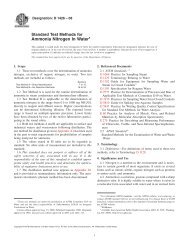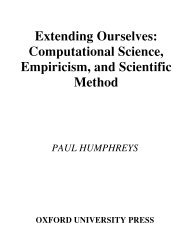Bad Astronomy: Misconceptions and Misuses Revealed, from ...
Bad Astronomy: Misconceptions and Misuses Revealed, from ...
Bad Astronomy: Misconceptions and Misuses Revealed, from ...
You also want an ePaper? Increase the reach of your titles
YUMPU automatically turns print PDFs into web optimized ePapers that Google loves.
186 ARTIFICIAL INTELLIGENCE<br />
dust next to ones about UFO aliens curing pimples using homeopathic<br />
crystals. Instead, even after half a century, it can be found<br />
on bookshelves today.<br />
PPP<br />
There’s an ironic footnote to this episode in the history of science.<br />
Certainly, scientists of the day dismissed Velikovsky because his<br />
assertions clearly flew in the face of everything known about physics<br />
<strong>and</strong> astronomy, then <strong>and</strong> still today. They also ridiculed him because,<br />
at the time, it was thought that the planets were fairly static.<br />
Things didn’t change much. Any change that occurred was gradual,<br />
slow, glacial. Nothing happened suddenly. This type of thinking<br />
is called uniformitarianism.<br />
However, this tide was turning. As observations of the planets<br />
improved, including our own, we started to learn that things didn’t<br />
always happen at a stately rate. The Moon is covered with craters;<br />
it was once thought that these were volcanic, but around the same<br />
time as Worlds in Collision was published, scientists were starting<br />
to speculate that at least some lunar craters were formed <strong>from</strong><br />
meteor impacts. Venus’ surface bears evidence that some massive<br />
event resurfaced the whole planet some hundreds of millions of<br />
years ago, <strong>and</strong> it looks like there have been many mass extinctions<br />
caused by individual catastrophic events here on Earth.<br />
Today we underst<strong>and</strong> that both uniformitarianism <strong>and</strong> catastrophism<br />
describe the history of our solar system. Things mostly<br />
go along slowly, then are suddenly punctuated by rapid events.<br />
Velikovsky supporters claim that he was simply ahead of his<br />
time, <strong>and</strong> his theories of catastrophism were denied their due. This<br />
is silly; just because he used the idea that catastrophes happened<br />
doesn’t mean that any of the things he described were right. But it<br />
is rather funny that scientists of the day were wrong in many of<br />
their assertions of uniformitarianism as well.<br />
Still, that’s the difference between science <strong>and</strong> pseudoscience:<br />
scientists learn <strong>from</strong> their mistakes <strong>and</strong> ab<strong>and</strong>on theories that don’t<br />
pan out. Velikovsky was wrong, as were the scientists at the time.<br />
But science—real science—has moved on. Maybe we can all learn<br />
something <strong>from</strong> this.
















